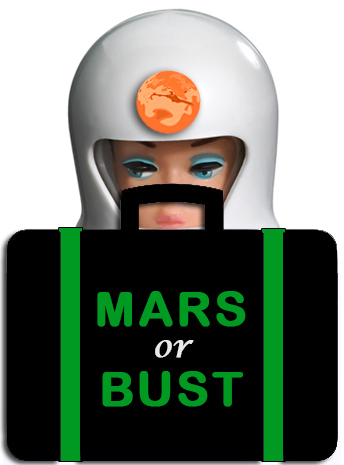Now that a week has passed since the "we regret to inform you" email from Mars One signaled my elimination from the planned mission to send the first humans to the red planet, it's time to unpack. As I watch my friends soak in the glory of the interviews they've earned on CNN, NBC, this very site and elsewhere, I have to move on, put my Mars One story in perspective, and acknowledge that my opportunity leave this Earth is part of my past, not my future.
While packing anticipates an adventure, unpacking takes it apart, item by item, each perhaps evoking a fond memory of the role it played during the time away. Unpacking a bag prepared for a journey not taken invites a deeper kind of reflection - not unlike the writer's strategy of "unpacking a story," a way to tease out and examine each element of one's narrative, to uncover the truths hidden in deep recesses of one's bag, to understand the ultimate significance of each item brought forth.
Each space-bound astronaut is allowed to pack small personal items that define him/her as an individual otherwise indistinguishable from the others wearing identical mission spacesuits adorned with matching mission patches and voicing the same mission-defined objectives. Good luck charms are high on the list, family heirlooms right behind. One ISS astronaut, a rabid baseball fan, took a vial of dirt from the pitcher's mound at Yankee Stadium.
After a week of careful self-examination, here's the dirt I'm pulling out of my bag.
Unpacking my emotions first. Not thrilled, but not devastated. Saw it coming. My right stuff veered off-focus partway through the "Round 2" astronaut selection process, as it slowly dawned on me that going to Mars at age 75 (that's how old I'd be upon arrival in 2025 - but I'd probably be even older due to mission timeline creep) may not be in my best interests, nor in the best interests of the mission. By the time my online interview with Mars One CMO and "Round 3" astronaut selector Dr. Norbert Kraft came around, I found I could not honestly and enthusiastically tell him I was fully committed to the mission.
Unpacking a few fibs I've been telling myself, and the truths they've been masking. While liberating myself from the limiting container I'd wedged myself into - the one that insisted I was preparing to live on Mars for the rest of my life, I realize I'd put myself there in the first place not because I wanted to go to Mars, but because, in my mind, I represented someone I absolutely believed should go to Mars.
Mars, for me, like all of space exploration, is a feminist issue.
Colonization of another world represents a future that does not discriminate, one that offers full and valued participation to men and women from all backgrounds and from diverse cultures - the kind of space program NASA was slowly coming around to when the shuttle program ended and efforts to venture farther into space faltered.
If successful, Mars One will provide its colonists a chance to create a new community. I believed in that community, and particularly in women's participation within it. I wanted to pivot, dip, wave both arms and shout amid this human re-creation, rather than cheer from the sidelines.
What I most regret is that Mars One mattered so much to me that I was willing to push full steam ahead at advanced age to relocate to a world that would not have treated me kindly. I blurred and eventually lost the boundary between what needed to be done and what I needed to do.
Unpacking my sometimes cavalier approach to idea of leaving Earth forever. Thanks to wise eBay bidding, I now own the entire line of Barbie astronauts, from the understated sixties blonde to the sequined one whose billowing Afro can barely be contained in her helmet and whose spacesuit easily converts to a disco outfit, to the pink-powered Mars Barbie of recent years. That's how invested I'd become - which is not that invested at all, considering I could have used that online shopping time to study exobiology, Martian geology, or alien horticulture.
If I'd taken the Barbies with me to Mars, they'd have served no useful purpose, but I'd have given them a chance to live the dream they so fashionably represented. Now they can change out of their spacesuits, stretch their legs in Earth gravity (not that 38% stuff on Mars) and breathe without having to manufacture the oxygen first. They can get comfortable again with life on Earth. So can I.
Many items packed by astronauts become far more valuable upon return for having flown in space, showing up for sale on "space collectibles" sites. The items packed but not taken into space may be less marketable but far more instructive, providing insights not easily delivered any other way. Moreover, they remain malleable, easily re-outfitted for future adventures.
My travel bag is non-judgmental, always ready to be filled, but just as ready to be emptied and set aside. No matter how many times I unpack, I pause each time to remind myself that, even if I've not left home, I've edged a few small steps closer to my next adventure.
Mars One, it turns out, is not the ultimate story for me, but a highly visible side trip, something shiny I saw from the side window of a moving vehicle, inviting enough to convince me to detour to take a closer look before realizing I did not need to stay there forever. My destination lies somewhere else in the universe.
